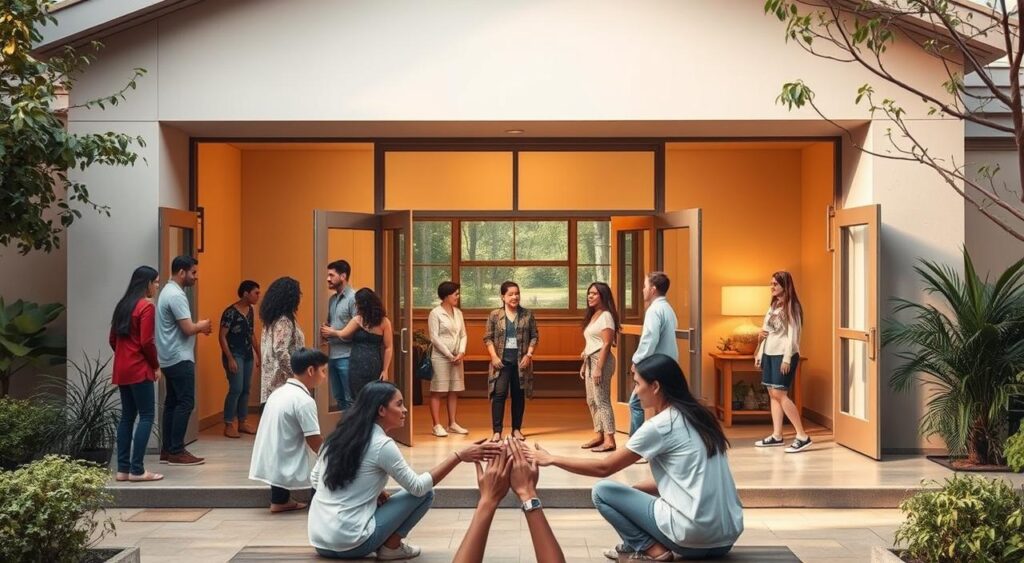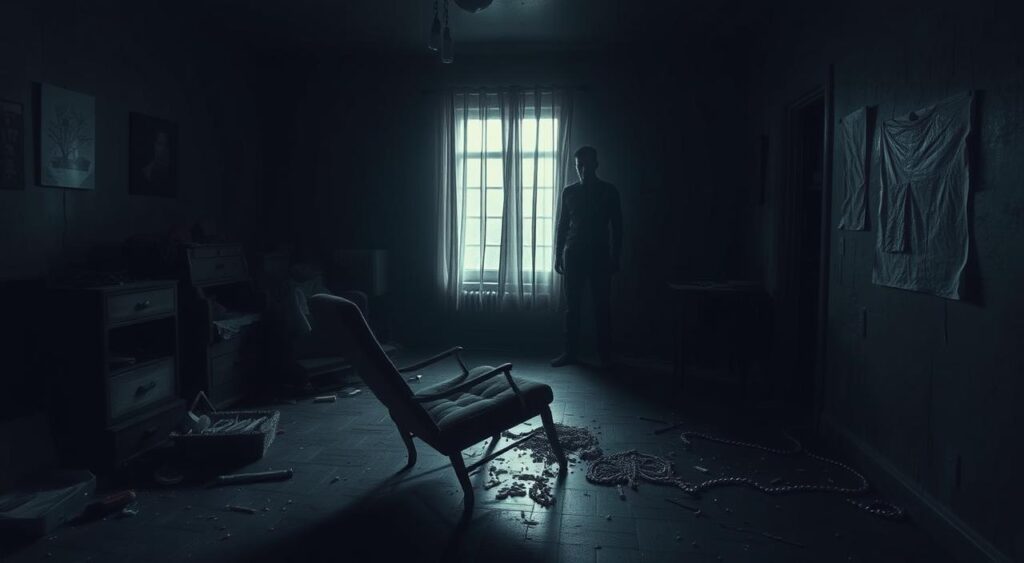The first time my wife hit me, I was shocked and unsure what to do. Should I fight back, cry, or run? Dr. Willard F. Harley, Jr., a psychologist, advises calling the police first. He says to separate, take photos of injuries, and get medical help1. Domestic violence is very dangerous and should never be ignored, even if it’s the first time. Learn why is my wife hitting me?
Being a victim of spousal abuse is not rare2. Studies show 1 in 4 men have faced physical violence from a partner at some point2. Men often don’t report abuse because of social stigma and gender norms2. While both men and women can be violent, men are less likely to report their injuries or seek help.
Key Takeaways
- Immediate response to domestic violence should include calling the police, separating, and seeking medical attention.
- Domestic violence affects both men and women, but men are less likely to report abuse or seek help.
- Domestic violence is a serious crime that should never be ignored, even if it’s the first time it’s happened.
- Effective anger management programs can help those with a history of violence, but the process can take time.
- Separation and seeking professional help are crucial steps in addressing domestic violence.
Understanding Domestic Violence
Domestic violence is a pattern of abuse used to control an intimate partner3. It includes physical violence, emotional manipulation, and financial control4. Recognizing these signs is key to tackling these complex situations4.
Abusers use tactics like gaslighting and threats to keep control4.
Recognizing the Signs of Abuse
Domestic violence can take many forms, from physical to emotional abuse4. Look out for signs like feeling controlled and experiencing verbal abuse4. Jealousy and a lack of remorse are also red flags4.
Strangulation is a severe sign that can lead to homicide4. Victims may struggle to see the abuse due to trauma4.
Power and Control Dynamics
Domestic violence often stems from a power imbalance4. Abusers use various tactics to maintain control4. These tactics can escalate over time, posing serious risks4.
Abusers may show good behavior to keep the victim in the relationship4.
Understanding power dynamics is key to tackling domestic violence4. Seeking help from professionals is vital5.
“Domestic violence can start subtly, with abusers gradually increasing their controlling and violent behaviors over time.”4
| Key Indicators of Domestic Violence | Prevalence and Impact |
|---|---|
|
By understanding domestic violence and its dynamics, we can help those affected4. Seeking help and building a support network are crucial steps3.
The Immediate Response
If you’ve faced physical violence from your wife, your first step is to ensure your safety and that of any children6. Over a decade, the husband has constantly verbally abused his wife without reason, showing a long history of behavior6. He uses verbal insults, manipulation, and makes her feel worthless6.
Prioritizing Safety
Call the police and get away from your wife to stay safe6. The husband often says sorry for his actions, showing a pattern of abuse followed by apologies6. It’s important to take photos of any injuries and visit the hospital6. This step is key to protecting yourself and setting the stage for legal action if needed.
Your emotional and physical health should be your main concern6. The situation has made the individual feel sad, anxious, and disturbed6. By acting quickly, you can begin to take back control and safety in your life.
Remember, you’re not alone. Getting help and support is crucial in dealing with this tough situation6. The person finds it hard to handle the verbal abuse, showing the difficulties in facing such behavior in a marriage6. By focusing on your safety first, you’re taking a vital step towards a brighter future.
Seeking Legal Assistance
After leaving an abusive situation, getting a lawyer is crucial. They can help with restraining orders, divorce, and custody issues if you have kids7. They also prepare you for court and ensure your safety7.
Divorces due to abuse need special legal help7. A lawyer skilled in domestic violence can get you protective orders7. They help with custody, assets, and support payments7. Getting a fair settlement is key7.
A good lawyer fights for your rights and offers emotional support7. They gather evidence and present your case well in court7.
If you’re accused of domestic violence falsely, get a lawyer to prove it was malicious8. Breaking a false restraining order can lead to more trouble8. It’s vital to show you’re a good parent8.
In Georgia, you can get a restraining order if you fear danger9. If you fear harm to yourself or loved ones, you might get a protective order9. Call 911 first if you’re in danger9.
You can get a restraining order for stalking, threats, or cyberstalking9. Cyberstalking, like revenge porn or messages, can get you a restraining order9.
| Key Considerations | Domestic Violence Victims | Individuals Facing False Accusations |
|---|---|---|
| Primary Objective | Securing safety, fair divorce settlements, and custody arrangements | Clearing their name, protecting parental rights, and avoiding legal consequences |
| Legal Strategies | Obtaining restraining orders, advocating for asset division and alimony | Establishing the malicious nature of accusations, preventing breach of restraining orders |
| Emotional Support | Guidance from compassionate lawyers to make informed decisions | Maintaining composure and consistent defense strategy during legal proceedings |
Building a Support System
Experiencing domestic violence can make you feel very alone and scared10. But, having a strong support system is key to getting better11. This includes family, friends, and groups that help survivors. They offer emotional support, help with daily tasks, and a safe place to start over.
Choosing who to turn to for help is very important11. You need people who support your choice to leave the abusive relationship12. The risk of violence is highest when a relationship is ending. So, having a supportive group can be a game-changer.
Involving Family and Friends
Family and friends are important in your healing journey11. They can listen, help with things, and make you feel part of a community during tough times10. But, think carefully about who you share your story with. Some people might not understand or could even help the abuse continue.
- Find trusted loved ones who respect your choices and support you.
- Stay away from those who might try to make you stay or downplay the abuse.
- Make a safety plan with your support network. This includes steps they can take if you feel in danger.
Creating a strong support network is vital for feeling safe and independent again11. With the right people, you can face challenges and look forward to a better future.

“Surround yourself with people who support your growth and wellbeing. Their presence can make all the difference in your healing journey.”
Considering Counseling and Therapy
Leaving an abusive relationship doesn’t mean the trauma goes away. A trauma-informed therapist can help you process your experiences. They can also teach you healthy ways to cope and help you regain your self-worth13. Even if you can’t meet in person, many therapists now offer online sessions.
Cognitive Behavioral Therapy and the Duluth Model are two methods used to change abusive behavior13. A 2004 study showed these therapies can reduce abuse, with therapy being slightly more effective than legal actions alone13. Therapy can motivate abusive husbands to seek help when they’re away from their partner.
The trans-theoretical model outlines stages of change for abusive husbands, from not thinking about it to maintaining change13. A supportive relationship can encourage abusive husbands to seek therapy. Being confrontational can actually make them less likely to change13.
Domestic violence affects nearly 20 people every minute in the U.S14.. Signs of abuse include controlling behavior, isolation, and financial control14. Victims may act in ways that seem wrong to others as a way to protect themselves.
Reactive abuse happens when the victim attacks the abuser15. This can lead to more harm to the victim than the abuser. It’s usually a result of extreme frustration or self-defense after long-term abuse15.
Getting professional help, like therapy for domestic violence victims, is key to healing. A trauma-informed therapist can help you face the abuse, learn to cope, and rebuild your life and relationships.
Addressing the Root Causes
First, make sure you’re safe and healing. Then, think about why the abuse happens. Programs for anger management can help the abuser control their anger and fix the deep issues16.
But, experts say real change needs legal actions and a true desire to change16. Signs of verbal abuse include insults, yelling, and playing the victim. Also, physical intimidation and throwing objects are red flags17.
Anger Management Programs
Anger management programs can help fix the root of abuse. They teach coping skills and how to handle issues like poor communication16. Start tough talks positively and set clear limits if insults happen17.
By tackling the deep issues, abusers can work towards better, respectful relationships. But, the journey is tough, and both sides must stay committed16. Paying attention to how you react to insults can help you stay calm and think clearly17.

“I’ve only seen lasting change in abusers who have faced legal consequences, such as jail time, and are truly committed to the therapy process.”
– Dr. Harley
Protecting Your Children
If you share children with your abusive wife, their safety is crucial. Domestic violence often targets women, and kids who see it are at risk too. They might face abuse or have behavioral issues18. Also, kids from abusive homes might grow up to be abusers themselves18.
It might be necessary to remove your kids from the situation. Seeking full custody can protect them from more harm. Even if your wife is the main caregiver, the court might choose you if it’s best for the kids18. Work with your lawyer to keep your kids safe18.
Seeing domestic violence can harm kids’ mental health. It can lead to depression, anxiety, and PTSD18. Keeping them safe is key during this tough time.
In the United States, laws protect everyone from domestic abuse, no matter their immigration status18. Immigrant survivors can get free or low-cost help like lawyers, shelters, and medical care18.
If danger is immediate, call 911 or local police. The National Domestic Violence Hotline at 800-799-SAFE (800-799-7233) offers help and local resource referrals18.
You’re not alone. There are resources to keep your kids safe and help you through this. Seek professional help and focus on your family’s well-being.
why is my wife hitting me
Domestic violence is often seen as a problem where men hurt women. But, the truth is, men can also be victims of abuse19. It’s hard for men to speak up because of how society views them. But, the danger of abuse is real, no matter who is doing it.
Wives might hit their husbands for many reasons. They might want power, have been hurt before, or think they can get away with it19. Abuse can be physical, verbal, or even financial19. Signs include trying to control, belittling, ignoring, or being overly jealous19.
Men in abusive situations might not talk about it because of what society expects19. The idea of being a “real man” can make it hard for them to ask for help19.
Seeing violence at home as a kid can make it seem normal19. It can also make you more likely to become a victim or abuser later19. We need to help break this cycle and support all victims, no matter their gender19.
Even though most victims are women, four million people are affected by domestic violence each year, including men20. North Carolina has laws to help those in abusive situations quickly20. The state’s Domestic Violence Act protects everyone, not just women20.
Many people have left abusive relationships with the help of the law20. Getting emotional support from mental health professionals is key20.
In custody battles, evidence of violence is often found21. But, how family courts view anger and gender can affect the outcome21. Mothers might get custody more often if they haven’t accused their partner of abuse21.
Deciding to leave an abusive relationship is hard, but it’s crucial for safety19. Domestic violence can happen to anyone, and we need to help all victims19.

If you or someone you know is in a violent relationship, please seek help. There are resources and support services ready to assist and keep you safe.
The Cycle of Violence
Domestic violence often follows a cyclical pattern. Understanding this cycle is crucial for recognizing the warning signs of escalating abuse.22 It has three phases: tension building, explosive incidents, and a “honeymoon” period where the abuser apologizes and promises it won’t happen again22.
Recognizing Patterns and Triggers
It’s important to know these patterns and triggers before an abusive episode22. Common triggers include financial problems, jealousy, substance abuse, and childhood trauma22. Knowing these signs helps you plan for your safety and not believe the abuse won’t happen again.
Domestic violence isn’t just physical; it can also be emotional, psychological, financial, and social23. The book “Stop Hurting the Woman You Love” offers tools like TIME OUT and the TEMPER Technique to replace abusive behavior. It also helps find the right therapist and support23.
“Domestic violence can affect anyone, regardless of gender.”22
Professional counseling is key for both the abuser and the victim22. It helps them understand abuse and develop healing strategies22. Therapy can help rebuild trust and improve communication in their relationship22.
But leaving an abusive relationship is hard22. With the right support and resources, it’s possible to stop domestic violence through intervention, legal action, therapy, and personal growth22.
The book “Stop Hurting the Woman You Love” helps individuals understand their behavior and break abusive patterns23. It includes an assessment called “What Kind of Abusive Man Am I” to encourage self-awareness and change23.
Many people have found the book helpful in their journey23. The book costs $16.95, and the Men’s Resource Center of West Michigan offers counseling and therapy options23.
Rebuilding Trust and Communication
Healing after domestic violence is a tough but important journey. It requires the abusive partner to seek help, take full responsibility, and change their behavior for a long time. Restoring trust and open communication is key, but always keep your safety first.
Talking to an abusive spouse is hard because of the power imbalance24. You must set clear boundaries and stay firm, even when faced with manipulation. Get help from counselors or support groups who understand domestic violence recovery.
Building trust takes time and effort from both sides24. The abusive partner must show they are serious about changing by acting consistently over time. This might include anger management, therapy, and learning to handle conflicts without violence.
“Change is possible for individuals who have engaged in domestic violence or abuse, but it requires significant effort, time, and intentional focus.”24
Deciding to stay together after domestic violence is a big choice. It should be made carefully, thinking about your safety and wellbeing24. Get support from loved ones, counselors, and advocates to help you through this tough time.

The journey to healing and trust is not easy; it has ups and downs24. With patience, determination, and a focus on your own growth, you can work towards a better relationship, if you choose to.
Leaving an Abusive Relationship
Escaping an abusive relationship can feel overwhelming. But, with the right planning and support, you can start a new, safer life. Domestic violence shelters and support services are here to help25.
Finding Shelter and Resources
Domestic violence shelters offer temporary housing and legal help. They provide a safe place for victims to heal and start anew26.
These resources also connect you with counseling, job help, and childcare. They aim to support you in rebuilding your life25.
“Leaving an abusive relationship can be the most dangerous time for a victim, as the risk of assaults and homicide can increase during this period.”26
Creating a safety plan is crucial. It ensures your safety and that of your children. Advocates can help tailor a plan for your needs26.
You’re not alone in this fight. Reaching out to shelters and resources can lead you to freedom from abuse25.
Dealing with Emotional Trauma
Healing from domestic abuse is a tough and deep journey. Victims often feel shame, blame themselves, and lose trust in themselves27. Getting help from professionals and joining support groups can help a lot28.
Emotional abuse can cause lasting mental health problems like anxiety, depression, and PTSD28. It can also lead to physical symptoms like a fast heart rate and chronic pain28. It’s important to face these emotional wounds, as ignoring them can harm you more in the long run28.
Healing means fighting negative thoughts and finding self-worth again28. Activities like exercise can help improve mood and lower depression risk28. With time and support, victims can regain their self-worth and trust others again27.
Domestic abuse’s emotional scars are deep, but healing is possible with the right help29. By facing these wounds and starting the healing journey, victims can take back their lives and look forward to a better future27.

You’re not alone in this fight. Seek help from professionals, support groups, and loved ones27. The journey is hard, but with courage and kindness to yourself, you can overcome the trauma and move forward28.
Legal Consequences for Abusers
Legal actions can stop domestic violence. Abusers might change if they face jail, fines, or a criminal record30. Restraining orders help victims by stopping abusers from contacting them31.
Restraining Orders and Prosecution
Many states see domestic abuse as a crime. Laws allow for arrest and court cases31. The harm done decides if it’s a misdemeanor or felony31.
Victims can sue for money, injuries, or emotional pain31. Being found guilty can mean losing rights, like guns or being a parent31. If you’re abused, get help fast. There are police, hotlines, and groups ready to help31.
Talk to your lawyer about your legal options. Taking action can make you safer and start your healing3031.
“Domestic violence is a serious human rights violation affecting millions of people worldwide.”31
Moving Forward with Resilience
Getting out of an abusive relationship takes a lot of inner strength. After going through domestic violence32, many survivors, like you, have grown a lot. They are determined to take back their lives. With the right support, help, and focus on healing, you can build a happy, violence-free life32.
Take each day as it comes, celebrating small wins. It’s okay to ask for help from family, friends, or professionals. Your journey shows your courage and strength33.
As you move on, tackle the reasons behind the abuse and heal emotionally. This might mean joining anger management programs33, counseling, and learning to communicate better. Remember, your worth isn’t tied to the abuse you faced32.
Surround yourself with people who get domestic violence and offer empathy and support33. Rebuilding trust and intimacy takes time, but it’s possible. With patience and resilience, you can build strong connections and a life free from fear32.
Know you’re not alone. Many have been where you are and come out stronger. Use their stories to inspire and guide you. See this as a chance to grow, learn, and come out even stronger34.
Your healing journey is unique, and you should be gentle with yourself. Celebrate your small wins and remember your resilience. With time, patience, and the right support, you can rebuild your life and find happiness and peace33.
Conclusion
Dealing with spousal abuse is tough and scary, but you don’t have to go through it by yourself. Taking quick steps to keep yourself safe is key. You should also look for legal and emotional support and try to understand why the abuse is happening.
By doing these things, you can start to leave the abuse behind and look forward to a safer future. You deserve to be safe, respected, and valued in your home and relationship. There are many resources and people ready to help you heal and move on.
The road to recovery is hard, but there’s hope. Using domestic violence resources and getting help for spousal abuse can help you take back your life. With the right support and a focus on growing personally, you can overcome the abuse and find happiness again.
Your safety and happiness are most important. By getting help and using the resources available, you can escape the cycle of violence. Remember, you’re not alone. There are many people and groups ready to support you on your journey to a better life.
FAQ
What should I do if my wife hits me for the first time?
Dr. Willard F. Harley, Jr. says call the police first. Then, separate and take photos of any injuries. Go to the hospital to confirm. Domestic violence is dangerous and should never be ignored.
What are the signs of domestic abuse?
Signs include physical violence, emotional manipulation, and financial control. Abusers also isolate their victims from friends and family. They use tactics like gaslighting and threats to keep control.
How can I prioritize my safety after experiencing spousal abuse?
Your safety is the top priority. Call the police and separate from your wife. Document injuries with photos and a hospital visit. This step helps protect you from further harm.
What legal options do I have as a victim of domestic violence?
Talk to a lawyer next. They can help with restraining orders, divorce, and custody. They ensure your safety in court and throughout legal proceedings.
How can I build a strong support system after leaving an abusive relationship?
Surround yourself with trusted family, friends, and support groups. They offer emotional support and practical help. They provide a safe space to rebuild your life.
How can therapy help me heal from the trauma of domestic violence?
A trauma-informed therapist is crucial. They help you process your experiences and rebuild your self-worth. Even virtual sessions can provide the mental health support you need.
Can an abusive partner change their behavior?
Anger management programs can help. But Dr. Harley says lasting change is rare. It requires legal consequences and a true commitment to therapy.
How can I protect my children from domestic violence?
Remove them from the situation and seek custody. Even if your wife is the primary caregiver, the court may grant you custody. It’s to protect them from further abuse.
Can women also be the perpetrators of domestic violence?
Yes, men can be victims of spousal abuse too. Women may hit their husbands for power, past victimization, or believing they can get away with it.
How can I recognize the patterns of domestic violence?
Look for tension, explosive incidents, and apologies. Recognizing these patterns helps you anticipate and plan for your safety.
How can I rebuild trust and communication in the aftermath of domestic violence?
Trust and communication take time and effort. The abuser must seek help, take responsibility, and show lasting change. Always prioritize your safety and well-being.
What resources are available to help me leave an abusive marriage?
Domestic violence shelters and advocacy groups offer help. They provide housing, legal aid, and more. Having a solid exit plan is key to your safety and your children’s, if applicable.
How can legal consequences deter further domestic violence?
Legal threats can motivate abusers to seek treatment. Restraining orders also protect victims by limiting contact or approach.
Source Links
- My Husband/Wife Hit Me. Now What? : Marriage Builders, Inc. – https://www.marriagebuilders.com/my-spouse-hit-me-now-what.htm
- How Should I Handle a Wife Who Hits Me and Then Claims That I Hit Her? – https://seekersguidance.org/answers/general-counsel/how-should-i-handle-a-wife-who-hits-me-and-then-claims-that-i-hit-her/
- My Wife Hits Me: What to Do When You Live With Domestic Violence – https://huskerlaw.com/blog/2023/08/my-wife-hits-me-what-to-do-when-you-live-with-domestic-violence/
- Ask Amanda: Is It Normal That My Husband Hits Me? – https://www.domesticshelters.org/articles/ask-amanda/ask-amanda-is-it-normal-that-my-husband-hits-me
- My Wife Is Physically Abusive – https://www.focusonthefamily.com/family-qa/my-wife-is-physically-abusive/
- Best Way To Deal With Verbal Abuse – https://www.mentalhealth.com/answers/best-way-to-deal-with-verbal-abuse
- Seeking Help and Legal Support to Divorce My Husband – https://kershlaw.com/my-husband-hit-me-and-now-i-want-to-divorce-him/
- Protecting Yourself Against False Domestic Violence Accusations – https://www.californiacriminaldefender.com/protecting-yourself-against-false-domestic-violence-accusations.html
- Can I Get a Restraining Order Even if My Spouse Never Hit Me? – https://www.klhffamilylaw.com/can-i-get-a-restraining-order-even-if-my-spouse-never-hit-me/
- I’m not sure if my relationship is healthy – Women’s Aid – https://www.womensaid.org.uk/information-support/the-survivors-handbook/im-not-sure-if-my-relationship-is-healthy/
- 7 Tips to Heal After an Abusive Relationship – https://psychcentral.com/health/how-to-heal-after-an-abusive-relationship
- Domestic violence and abusive relationships – https://www.healthdirect.gov.au/domestic-violence-and-abusive-relationships
- How To Get Your Abusive Husband Into Therapy…Safely – OnlyYouForever – https://www.onlyyouforever.com/how-to-get-your-abusive-husband-into-therapy-safely/
- Addressing intimate partner violence with clients – https://www.counseling.org/publications/counseling-today-magazine/article-archive/article/legacy/addressing-intimate-partner-violence-with-clients
- What Most Miss About Reactive Abuse – https://themendproject.com/reactive-abuse/
- How to Deal with a Quarrelsome and Nagging Wife : Marriage… – https://www.marriagebuilders.com/how-to-deal-with-a-quarrelsome-and-nagging-wife.htm
- My Spouse Is Putting Me Down. (How Do I Get Them to Stop?) – https://firstthings.org/spouse-putting-me-down/
- Recognize the signs of domestic violence against women – https://www.mayoclinic.org/healthy-lifestyle/adult-health/in-depth/domestic-violence/art-20048397
- Ask Amanda: My Girlfriend Is Hitting Me – https://www.domesticshelters.org/articles/ask-amanda/ask-amanda-my-girlfriend-is-hitting-me
- Divorcing from an Abusive Spouse: What You Need to Know – https://www.rosen.com/domestic/darticles/divorce-and-domestic-violence/
- She Said Her Husband Hit Her. She Lost Custody of Their Kids – https://www.themarshallproject.org/2020/07/08/she-said-her-husband-hit-her-she-lost-custody-of-their-kids
- Why Is My Wife Hitting Me? Learn Why and How to Get Help – https://ifctherapists.com/blog/why-is-my-wife-hitting-me/
- Stop Hurting the Woman You Love: Breaking the Cycle of Abusive Behavior – Men’s Resource Center – https://menscenter.org/product/stop-hurting-woman-you-love/
- Is Change Possible | Re-establishing Trust | Safety Concerns – https://www.ananiasfoundation.org/reconciliation-after-domestic-violence/
- How to Know if You’re in an Emotionally Abusive Relationship – https://www.focusonthefamily.com/marriage/marriage-problems/how-to-know-if-youre-in-an-emotionally-abusive-relationship/
- What to Do After an Abusive Partner Breaks Up With You – https://www.thehotline.org/resources/what-to-do-after-an-abusive-partner-breaks-up-with-you/
- When Your Partner Doesn’t Understand Your Trauma — Baltimore Annapolis Center for Integrative Healing – https://www.bahealing.com/connectwithyourtrueselfblog/2017/3/16/when-your-partner-doesnt-understand-your-ptsd
- How to Heal From Emotional Abuse in Relationships: Therapist Approved Strategies [2022] – https://mindwellnyc.com/how-to-heal-from-emotional-abuse-in-relationships/
- Recognizing the effects of abuse-related trauma – https://www.camh.ca/en/health-info/guides-and-publications/recognizing-the-effects-of-abuse-related-trauma
- 10 Signs You’re the Husband of an Abusive Wife – https://www.ballmorselowe.com/blog/10-signs-youre-the-husband-of-an-abusive-wife
- Understanding the Legal Consequences of Domestic Abuse – CAWC – https://www.cawc.org/news/understanding-the-legal-consequences-of-domestic-abuse/
- From Darkness to Resilience: My Journey Through Abuse and Recovery by Christian T – Break The Silence Against Domestic Violence – https://breakthesilencedv.org/from-darkness-to-resilience-my-journey-through-abuse-and-recovery-by-christian-t/
- Why your wife keeps bringing up the past, won’t let it go, and what you can do about it – https://svenmasterson.com/1124/why-your-wife-keeps-bringing-up-the-past-wont-let-it-go-and-what-you-can-do-about-it/
- How My Late Wife’s Resilience Set Me Free From Worry and Stress About Life – https://medium.com/real-insight/how-my-late-wifes-resilience-set-me-free-from-worry-and-stress-about-life-fa3cabeb2d52







